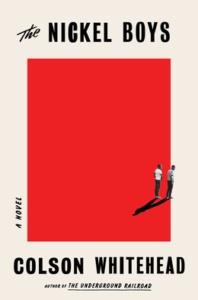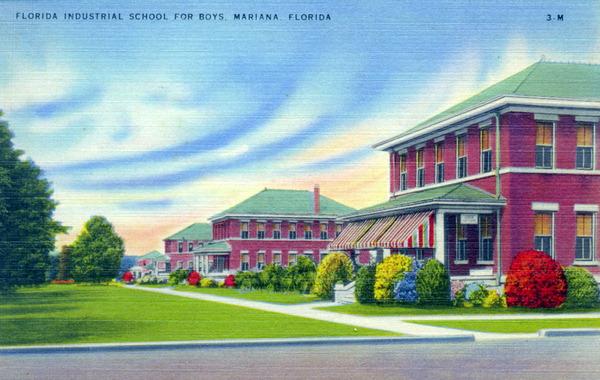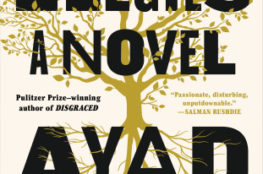The Nickel Boys by Colson Whitehead. Doubleday, 2019
Colson Whitehead’s new novel, The Nickel Boys, is a fictional story that occurs in a real location with GPS coordinates and a name on the map. The author creates a narrative built around verified reports of what happened at the Dozier School for Boys in Marianna, Florida.  It was once the largest reform school in the United States. It had a large campus and a polished exterior which veiled the horror show of beatings, molestation, and murder that occurred there. The school operated from 1900 until it was closed in 2011, after inspections uncovered appalling evidence of a longterm pattern of abuses.
It was once the largest reform school in the United States. It had a large campus and a polished exterior which veiled the horror show of beatings, molestation, and murder that occurred there. The school operated from 1900 until it was closed in 2011, after inspections uncovered appalling evidence of a longterm pattern of abuses.
Whitehead could have written a non-fiction account; certainly he has the talent as a writer. He could have given us numbers to detail how many boys were detained, and he could have cited coroners’ reports and forensic evidence gathered when a team from the University of Florida excavated the graveyard on the property. The gruesome evidence of their reports has been confirmed in accounts provided by the men who were sent to the school when they were boys, and the stark details are readily available to anyone who bothers to do even an elementary internet search for details about the school.
The Nickel Boys goes deeper than cold facts. Whitehead uses the skills of brilliant fiction writing to walk readers up close to the personal nature of the cruelty suffered by the boy victims of the Dozier School. He introduces us to Elwood, a young boy being raised by a grandmother, who labors as a hotel maid to support him. She suffers for him and clings to the faintest glimmers of hope that his life will someday be something that was never possible for her. He is a smart kid, eager to learn, ready to read anything he can get his hands on. His dream of going to college seems within reach.
Elwood’s fall from hope into despair pivots on an event that could not be predicted. On his way to visit the campus of the college he hopes to attend, Elwood hitchhikes, but the man who picks him up is driving a stolen car. This incident echoes the story of Jefferson told in Ernest Gaine’s A Lesson Before Dying. In that story an innocent man hitches a ride with two men who stop off at a store and end up robbing it. Both Jefferson and Elwood are ruined by being in the wrong place at the wrong time. In both stories their mistake is not having their own transportation, as if poverty and lack transportation can honestly be called a mistake.
Whitehead’s ability to juxtapose hope and hopelessness is profound. One Christmas young Elwood had been given a record of the speeches of Martin Luther King Jr., and he had listened to them so many times, he knew them from memory. He wants to be the man Dr. King describes, but one ride in the wrong car has turned his fate around. Elwood is torn out of the safe zone of his grandmother’s love, and sent to a reformatory, but the words of Dr. King go along with him, and they run through his mind continuously as if they are his own.
Elwood keeps hearing the voice of Dr. King reminding him never to relinquish his will to be somebody, no matter how much others try to put him down. Locked away in an ugly and cruel place Elwood reviews Dr. King’s Letter from Birmingham Jail. He hears, recorded indelibly in his own memory, his hero’s promise that nobility comes from the power of love and the will to help others.
At the training school Elwood is starved and overworked. No matter how hard he tries to preserve his own nobility, he is nonetheless subjected to the same despicable treatment that all the boys suffer. When he intervenes to stop a boy who is bullying another, he is taken to the notorious white shed for a beating, along with the bully and the victim. Like the others he is beaten with a leather strap that leaves deep bruises and open wounds. Effort and good intentions make no difference.
It is unsettling to be reminded of Martin Luther King Jr.’s speeches in tandem with accounts of Elwood’s horrifying experiences. Whitehall forces us to look squarely at hate and venality. We are made to see that where justice is suspended anything can happen. The author will not let us turn our gaze away so that we can avoid the hard questions. What finally has more power, love or hate, innocence or evil?
Locked away in solitary confinement, in a room without light, and aching from a beating he has barely survived, Elwood is forced to rethink Dr. King’s noble words. “The world had whispered its rules to him for his whole life and he refused to listen.” It had told Elwood not to love, or trust, or stand up to be counted, but he resisted and went on believing the message of a higher way. He wanted so earnestly to believe what Reverend King had preached: “Love and the love will be returned, trust the righteous path and it will lead you to deliverance, fight and things will change.” These are the words of Dr. King to which he had been clinging to keep his hope alive.
As Whitehead’s skilled writing brings us into the cell with Elwood, we are told: “In those long hours, he struggled over Reverend King’s equation…. No, he could not make the leap of love. He understood neither the impulse of the proposition nor the will to execute it.”
This might be a place to end a story as tragic as the story of Elwood, but Whitehead does not leave us there. That would be too clear a conclusion. In a sense that would be too easy. The author pushes us on and continues the story. He brings us into the present with an epilogue that makes us realize that, even if we can close the book, the story is not done.



